As states across the country issued stay-at-home orders last spring, essential workers carried on working and took on personal risks to keep the country functioning. Among their ranks were several Middlebury students who faced daily concerns about personal and familial health, battled exhaustion, balanced school work and struggled with their mental health. These are the experiences of a few MiddKids who worked, and continue to work, on the frontlines.
Concern for family
For student essential workers, deciding to work was not without pause: many worried that they would become sick at work and infect their families when they returned home. Meg Haberle ’22, worked at a private ambulance service in Worcester, Mass. She would immediately place all her items in a plastic storage unit, shower and wash her uniform upon returning home before interacting with the rest of her family.
Alex Myers ’23, who worked as a cashier at a craft store over the summer, lived in isolation at her extended family’s home in Chatham, Mass. When cousins came to stay, she quarantined herself to avoid any chance of infection.
Emily Klar ’21 began working as an EMT in Bethel, Vermont immediately after being evacuated from Middlebury in March. Her mother, a registered nurse at a local hospital, worried for her and her daughter’s safety given that their jobs could potentially put them in contact with Covid-19 patients. She nearly quit her own job and urged her daughter to stop working as well.
“I’m deciding to continue working on the frontlines [because] I think I am relatively healthy, and I want to give back to my community now that they need me the most,” Klar recalled telling her mother.
This semester, Klar is living in Weybridge, Vermont. She is enrolled as a remote learner and continues to work as an EMT.
Battling frontline fatigue
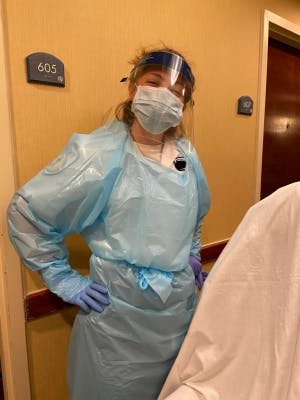
While the pace of life has slackened for many during the pandemic, frontline workers have felt opposite effects.
The private ambulance company where Haberle worked frequently contracts with the Federal Emergency Management Agency (FEMA). When FEMA asked the company for volunteers to deploy to New York City during the height of the pandemic there, Haberle stepped up.
“I felt like I had a calling to go to New York City,” she said. “I have the skills, the means, the opportunity. I couldn't reconcile not going.”
She worked 12 hours a day, seven days a week with only one day off during the three weeks she was there. Dressed from head to toe in PPE, her plastic hospital gown became a sauna in the sweltering July heat as she moved people and bodies in and out of her truck. Haberle recalled returning to the hotel each night and crawling into bed, utterly spent, only to start all over again in the morning.
Haberle missed the end of the school year — including finals — to volunteer. In rare moments of peace, she would watch recorded lectures and scribble down biochemistry notes on the truck’s dashboard. She recalls staking out parks to wander through when she called her mom, who tried, — and failed — to hide her concern for her daughter.
However, the details that most stood out to her were not the crippling exhaustion nor the fear of contracting the virus, but the food. Haberle quickly grew tired of the eggs and cheese provided to the crews each morning. She relished the opportunities to order from the local restaurants, and raved about the delicious dumpling and Mexican food joints scattered throughout Jamaica, Queens, where she was stationed.
Hazardous working conditions

Myers felt unsafe and uncomfortable working as a cashier at a craft store under conditions that placed her at risk for contracting Covid-19. Her boss did not believe in the effectiveness of masks nor the seriousness of the pandemic. He refused to wear a mask or require patrons to wear masks and follow social distancing requirements mandated by state law.
Myers felt that her employer placed her health and safety at risk, all while paying her minimum wage. Although she could not convince her boss to implement safety protocols, he did acquiesce to her demand for hazard pay. Meanwhile, Myers tried to enforce state health requirements within the store, repeatedly reminding patrons to wear their masks or telling them to wait outside when the store became crowded.
Though she never felt that anyone actively endangered her life, she described several “close calls” where gentle reminders of state guidelines ended in “screaming matches” with patrons. Myers did her best to remain patient and “kill them with kindness,” but the frequent confrontations wore her down.
“The hardest part of the job was making sure people were aware that we are in a pandemic,” Myers said.
A toll on mental health
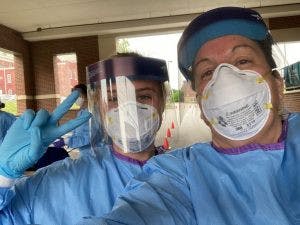
Throughout the spring and summer, first responders reported high rates of PTSD and burnout. But Emily Luber ’22, who worked as an EMT in Middlebury and Fairhaven and at a pop-up Covid-19 testing clinic, found that, in some ways, working during the pandemic helped her mental health.
“I don’t do well when I’m at home, and I also don’t do well when I’m not busy and when I’m not being social,” Luber said. "If I had just been at home at Massachusetts this summer, I probably would have lost my mind.”
Similarly, Klar saw work as an escape from a house where she had only her family and her schoolwork for company. Working, she said, provided her with the opportunity to “feel like I was doing something.”
For Klar, one of the hardest parts of the pandemic was seeing the decline in other people’s mental health. Klar, who has worked as an EMT since June 2019 and started working as soon as she was sent home, noticed an increase in attempted suicide calls.
Public praise only goes so far
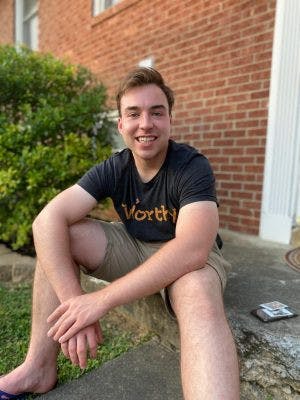
Throughout the early months of the pandemic, politicians and the media repeatedly praised frontline workers for the essential role they were playing in keeping the country functioning. Some of these workers, however, found the praise hollow and frustrating in the face of their daily reality.
Will Anderson ’20.5 planned to spend the summer working at an internship he hoped would turn into a job after he graduates in February. When the company canceled all their internships, Anderson returned home to a job at the Whole Foods he has worked at since high school in Hingham, Mass.
Anderson described “waking up everyday to a cognitive dissonance.” While the news praised essential workers like him, he faced verbal attacks from customers refusing to follow the Covid-19 safety protocols.
“The attacks felt more real than messages of ‘Thank you essential workers,’” he said.
Haberle also grew frustrated at the hollow public praise for EMTs and essential workers. While politicians and the public lauded their efforts, they gained nothing materially substantial or helpful to combat how chronically underpaid and overworked they were and continue to be, according to her.
“The appreciation frustrates me,” Haberle said. “Thanks for the bagels. I just want a raise.”
Finding a pandemic work-school balance
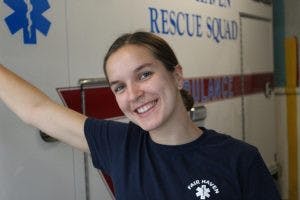
Klar continues to work at three different ambulance services in Vermont as she studies remotely. After working 60 to 100 hours a week during the summer, she has now cut back to 36 hours, which still amounts to nearly a full time job.
Klar said she prefers working to school. Her job helps lessen and put into perspective her anxieties about classes. While the demands of her classwork can feel all-consuming, no one is dying in her biology class.
Haberle feels glad to be back on campus but worries about students not following social distancing and other health guidelines. Her work has given her an image of what the virus looks like up close.
“I don’t know if everyone quite realizes what it's like and what happens when it picks back up again,” she said.
For Anderson, returning to Middlebury has brought him “a feeling of closure.” He relishes in the opportunities to see old friends and enjoy his last semester on campus. Instead of worrying about contracting Covid-19 at work and bringing it home to his family, he now frets that “the bees will get diabetes, and the squirrels will get high cholesterol.”
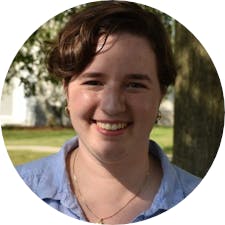
Sophia McDermott-Hughes ’23.5 (they/them) is an editor at large.
They previously served as a news editor and senior news writer.
McDermott-Hughes is a joint Arabic and anthropology and Arabic major.
Over the summer, they worked as a general assignment reporter at Morocco World News, the main English-language paper in Morocco.
In the summer of 2021 they reported for statewide digital newspaper VTDigger, focusing on issues relating to migrant workers and immigration.
In 2018 and 2019, McDermott-Hughes worked as a reporter on the Since Parkland Project, a partnership with the Trace and the Miami Herald, which chronicled the lives of the more than 1,200 children killed by gun violence in the United States in the year since the Marjory Stoneman Douglas High School shooting in Florida.
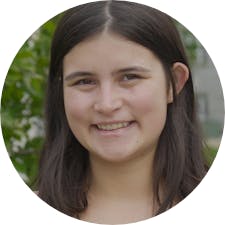
Sarah Miller '24 (she/her) is an Editor at Large.
She previously served as Opinions Editor and Staff Writer. Miller is an English major on the Creative Writing track. She hails from Philadelphia and spent the spring studying English at Trinity College Dublin. She has interned for The New England Review and hosts a WRMC radio show where you can still listen to her many opinions.




